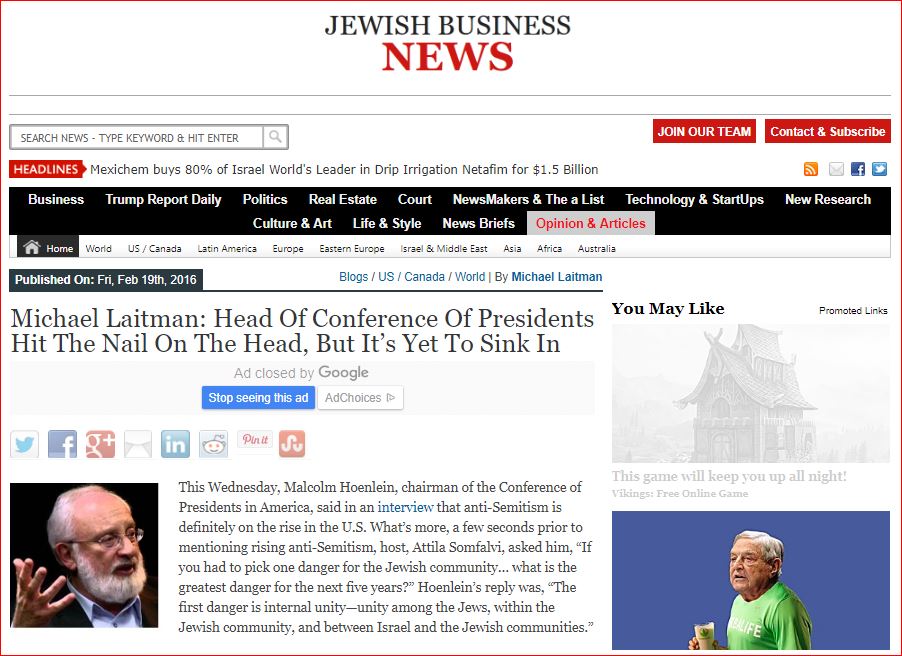
This Wednesday, Malcolm Hoenlein, chairman of the Conference of Presidents in America, said in an interview that anti-Semitism is definitely on the rise in the U.S. What’s more, a few seconds prior to mentioning rising anti-Semitism, host, Attila Somfalvi, asked him, “If you had to pick one danger for the Jewish community… what is the greatest danger for the next five years?” Hoenlein’s reply was, “The first danger is internal unity—unity among the Jews, within the Jewish community, and between Israel and the Jewish communities.”
It is very encouraging to see that such a pivotal figure in American Jewry acknowledges unity as our foremost problem. It is far less encouraging to think of the obstacles this view must overcome before it becomes mainstream within the Jewish community, both in the U.S. and in Israel. At present , the atmosphere within the American Jewish community is fraught with mistrust and alienation, and the upcoming elections are deepening the chasm between supporters of the “Donkeys” and supporters of the “Elephants.” Similar to the U.S., the political public discourse in Israel has reached new heights of animosity and virulence during the last elections, and has since refused to abate.
Regrettably, for the majority of us to recognize just how crucial unity is to our survival, it seems to require more of the ingredient that normally pushes us together, namely anti-Semitism. Without Jew-hatred we would never want to unite and would continue to champion wanton capitalism and competition as though they were God’s gift to humanity. It is only when the world bashes us collectively that we remember that actually we are the ones who engendered the motto, “Love your neighbor as yourself, ” and that we have been promised that in this lies our salvation.
It is very natural not to desire unity. When we think of it, we immediately think of the compromises and concessions we would need to make, and who wants that?
But here’s where we get it wrong. Consider this: If you could raise your children in such a way that they would never have to compromise and could always do what they wanted and have what they wanted, and it would still not make them spoiled rotten, would you not want it for them? This is exactly the great benefit of the special unity that the people of Israel developed through loving our neighbors as ourselves.
When you feel so united that you are as one entity, then the more powerful each element in the united collective becomes, the more the collective benefits. In practical terms it means that we can and should develop our unique capabilities to the maximum, but we should do so for the sake of society instead of for ourselves. This is a concept to which every Jew is inherently inclined, and which, if implemented, unleashes unimaginable powers into society.
In such an atmosphere we could truly be who we are without having to waste energy erecting defenses, since we would know that each of us contributes our unique selves to the betterment of the whole. Instead of competing, we would encourage each other to be unique, to thrive, and to excel because we would know that the gain of each of us is the gain of all of us.
This is the type of “light unto nations” we should aspire to be. It is the type of society of which British historian, Prof. Paul Johnson, wrote in A History of the Jews:
“At a very early stage in their collective existence they believed they had detected a divine scheme for the human race, of which their own society was to be a pilot.”
If we can help one another foster such a society, we will eradiate anti-Semitism not by fighting it, which is clearly a futile battle, but simply by setting an example of how we should really relate to one another, and how we can achieve it.
Featured in Jewish Business News